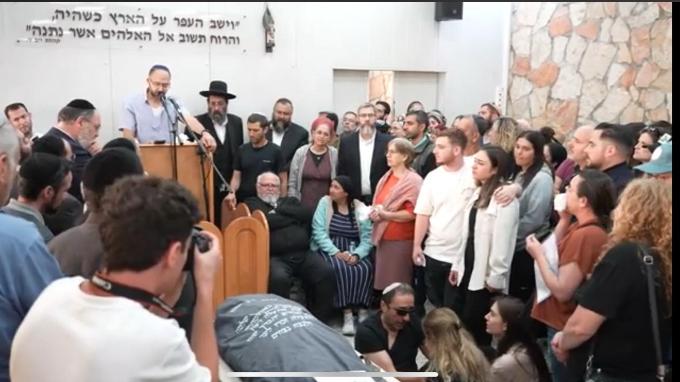Tz’ela Gez’s funeral was held a few weeks ago. As seen in the footage, Samarian politician Yossi Dagan’s eulogy was interrupted by my sister-in-law’s bereaved sister, who shouted at him for politicizing the event and demanded that he stop speaking and leave the podium. I do not know who arranged the funeral or decided who would eulogize our late sister-in-law. I was surprised, for instance, that neither Tz’ela’s father nor our mutual father-in-law were invited to speak. The night before the funeral, unable to sleep, I began writing what I would say if asked to eulogize Tz’ela. I had those notes in my pocket during the service. When her sister began shouting at Dagan, I was unsure how to respond. In principle, I agreed with her objection to politicizing the event, as I will explain, and I also agreed with parts of Dagan’s message. However, others were clearly in charge, and decisions had been made. Neither my bereaved brother-in-law nor the rabbi advising him intervened, so I chose not to intervene in a situation where my opinion was not sought.
Maimonides writes: “The eulogy is included in the honor due to the deceased. Therefore, we compel the heirs to pay the wages of the men and women who chant the dirges and eulogize him. If the deceased had directed that he not be eulogized, we do not eulogize him. If, however, he directed that he not be buried, we do not heed him, for burial is a commandment, as Deuteronomy 21:23 states: ‘And you shall certainly bury him.’ Anyone who is lax regarding the eulogy due a scholar will not live long. Anyone who is lax regarding the eulogy of an upright person is fit to be buried in his lifetime. And anyone who sheds tears for a decent person—his reward for this is saved by the Holy One, blessed be He.” The Tur and Shulchan Aruch add that the speaker “should raise his voice and recount matters concerning the deceased that break the heart in order to increase the weeping, and to recount the deceased’s praises.”

The sages of the Talmud treated eulogies almost as the property of the deceased. The deceased can forgo them, but if not, the heirs are required to use inherited funds—or even their own money if the deceased left nothing—to pay for proper eulogies. Speakers must ensure they only say what the deceased would have wanted said in their honor. For someone like my late sister-in-law, who was apolitical in life, we must err on the side of caution and avoid political speeches. I am convinced she would not have wanted politicians to eulogize her. However, it was also necessary to use the occasion to rebuke the community, as is the proper Jewish response to calamity. I did not ask to speak because, although I believed my words might benefit Klal Yisrael, they were not entirely free of political undertones. Unlike most speakers, I am not a politician but a family member, yet my words still did not fully meet the narrow requirements of halacha and would have been unfair to her memory. For another individual, such words might have been appropriate, and at a public gathering that was not a funeral, they would certainly need to be said. I only pray that God will heal my voice and allow me to speak these words aloud one day.
When confronted with such a terrible tragedy, it is obligatory for us to look inward. Hananel has been outspoken in his militancy. With his unfortunate newfound fame, he has called out major politicians, especially the prime minister, both imploring and demanding major policy changes. I do not share his sentiments, as I believe that the actions of the prime minister and the regime over the past few decades—such as the Oslo Accords, the intifadas, the Gaza disengagement, the lockdowns, and now the most recent war—are deliberate and part of a plan to harm the Jewish community. So too is this tragedy. Rather than focusing on political demands, we must acknowledge that this calamity has befallen us due to Divine Justice. We must search for the personal and national misdeeds that brought this about, for there is no shortage of such failings to address.
In Genesis 42:21, we read how Joseph’s brothers began to realize that their plight was the result of divine justice:
וַיֹּאמְר֞וּ אִ֣ישׁ אֶל־אָחִ֗יו אֲבָל֮ אֲשֵׁמִ֣ים ׀ אֲנַ֘חְנוּ֮ עַל־אָחִ֒ינוּ֒ אֲשֶׁ֨ר רָאִ֜ינוּ צָרַ֥ת נַפְשׁ֛וֹ בְּהִתְחַֽנְנ֥וֹ אֵלֵ֖ינוּ וְלֹ֣א שָׁמָ֑עְנוּ עַל־כֵּן֙ בָּ֣אָה אֵלֵ֔ינוּ הַצָּרָ֖ה הַזֹּֽאת׃
In Genesis 42:21, we read how Joseph’s brothers:
said to one another: “We are truly guilty concerning our brother, for we saw his deep distress when he pleaded with us, yet we did not listen; therefore, this trouble has come upon us.”
The Vilna Gaon teaches that even the cantillation marks, which serve as musically encoded punctuation for the verses, can reveal deeper meaning. In this verse, the introductory phrase is marked with the tropes gershayim and ravia, the former meaning “double banished” and the latter meaning “crouching.”
They said to one another: ‘We are truly guilty concerning our brother
Doubly banished crouching Thrown out, thrown out treasured
for we saw his deep distress when he pleaded with us, yet we did not listen;
Got up, and went broken little by little set in place
Therefore this trouble has come upon us.
The Midrash notes that Joseph’s brothers feared their sin would cause them to be rejected from God’s chosen nation. Joseph, their father’s favorite, did not deserve their harsh treatment. Yet, even when confronted by his pleas, they stood steadfast in their resolve to harm him.
We, too, have failed to listen to the cries of our unfortunate brethren, despite hearing their distress. Tze’ela was not the first victim of such barbarity, and many actions could have been taken to prevent her murder.
To that end, I propose we follow the example of our ancestors and confess our sins:
Forgive us, our Father, for we have sinned; pardon us, our King, for we have transgressed.
You commanded us to appoint a king of Your choice. Woe unto us, for we have rebelled and appointed leaders whom You have not chosen and who do not do Your will.
You commanded us to drive out the hostile inhabitants of the land so that we may settle it. Woe unto us, for we have left them as thorns in our eyes and pricks in our sides, and they harass us throughout the land.
You commanded us to destroy Amalek, those who would do anything to destroy us. Woe unto us, for we have allowed them to prosper and multiply, and they continue to kill us.
You commanded us to wage war according to Your laws for the sake of our people and our land, promising victory if we did so. Woe unto us, for we have either refused to wage war or fought with perverse intentions, and thus we have not been victorious.
You commanded us to settle the enviable and fertile land You gave us. Woe unto us, for we have remained distant from it and allowed strangers to inherit it.
You commanded us to appoint judges in our gates to teach Your Torah and adjudicate according to it. Woe unto us, for we have appointed arrogant, godless ignoramuses to legislate by their whims and pervert justice.
You commanded us to build a house for Your great and holy Name. Woe unto us, for we have left it abandoned and in ruins.
You commanded us to worship You there and bring our sacrifices. Woe unto us, for we beat and imprison those who seek to serve You as You commanded.
You commanded us to be holy, to abstain from forbidden relations, and to acknowledge Your omnipotence and timelessness by keeping Your Sabbaths and rejecting false gods. Woe unto us, for we have desecrated Your Sabbaths with gatherings dedicated to fornication and idolatry.
You commanded us to love one another as we love ourselves. Woe unto us, for we have hated and pursued each other instead of our enemies.
You commanded us to trust in You alone. Woe unto us, for we have placed our trust in noblemen, wealth, and arms that fail to save us in times of need.
You gave us Your Law and commandments for our own good. Woe unto us, for we scarcely study Your Law and too often choose to ignore its commandments.
Therefore, we seek Your forgiveness and commit ourselves to keeping Your commandments henceforth.






